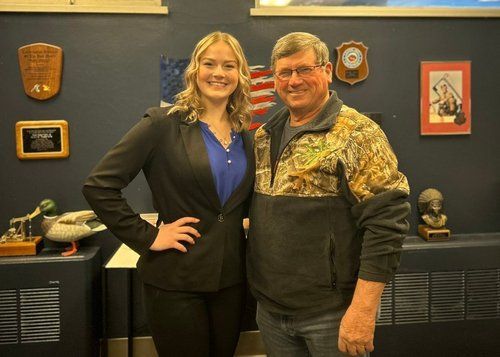Representative Wayne Rosenthal: A Lifetime of Service and Commitment
Lyndi Allen
Wayne Rosenthal’s life is a mix of hard work, service, and strong values. He is an Illinois farmer, former IL Corn Marketing Board leader, retired Air Force pilot, and public servant. Rosenthal's office is filled with awards and memorabilia from all these passions - even baseball and softball awards and hunting trophies - reminding him daily of the experiences and passions that have shaped his life. Together, they represent a man deeply committed to service, family, and traditions of rural Illinois.
Born into a farming family, Rosenthal is a fourth-generation farmer whose family originally immigrated from Germany in the 1890s. His grandfather was among the first to farm on Illinois soil, a tradition that Rosenthal has proudly continued and passed down to his sons and grandchildren.
“I took over my father’s farm in 1990 after spending 30 years in the military,” Rosenthal recalls. “One of the reasons I started no-till farming was because I used to fly Air Force with Jim Kinsella, a big proponent of the practice. Ever since then, I’ve stuck with no-till and expanded our operation from 300 acres to around 1,700 acres.” His farming operation is now in Christian, Montgomery, and Macoupin counties, including cropland, timber, wetlands, and Conservation Reserve Program (CRP) ground.

Farming isn’t Rosenthal’s only early-morning responsibility. “My day starts around 3:30 or 4:30 in the morning because I also run a hunting preserve. Matter of fact, before I came here today, I was out taking care of pheasants for hunters. There’s always something to do.” Luckily, he and his wife Marcia have three sons who gave him seven grandchildren. His sons have full-time careers but return to help him during the farming season. His role as husband, father, and grandfather is his favorite. Rosenthal’s dedication to agriculture extends beyond the fields. His involvement with the Illinois Corn Marketing Board gave him a broader perspective on the industry. “Dave Loos reached out to me about joining, and I knew I’d have to resign once I was re-elected, but the experience was invaluable. I built relationships with farmers across the state, and now I advocate for them in the legislature.”
Rosenthal’s political career began in 2011 when he first served in the Illinois House of Representatives. In 2015, he became the Director of the Illinois Department of Natural Resources, a role that allowed him to use the leadership skills he learned in the military. “Managing people in the military helped me tremendously in that position. It’s all about finding solutions and getting things done.”
Now back in the House for his second term, representing the 108th District, Rosenthal finds being a part of a super minority is all about connections and educating about agriculture. “Many legislators are from the northeast part of the state, and we have to work hard to build trust and explain how policies impact rural communities. Educating and forming relationships is key to ensuring agriculture remains a priority.”

Despite the political challenges, Rosenthal is dedicated to his mission and his people. “The most satisfying part is helping people navigate bureaucracy. When someone calls to say, ‘thank you’ because we helped them solve a problem, that’s the best reward.”
Bipartisanship is essential for advocating agriculture, especially in this state. “There’s only one Democrat in the Senate with a farming background—Senator Patrick Joyce. The rest of the farmers in Springfield, like Charlie Meyer, Dan Swanson, and me, are Republicans. We sit on the Agriculture Committee and work to establish relationships and educate our colleagues on how legislation impacts farmers.”
For young farmers or those looking to enter industry, Rosenthal emphasizes the large variety of opportunities beyond traditional farming. “There are so many paths in agriculture, like precision ag, marketing, and agribusiness. Even those who haven’t grown up on a farm can find careers in this field.”
As an advocate for Illinois agriculture for quite some time, Rosenthal emphasizes the importance of farmers advocating in legislation. “The decisions that impact our markets are made in Springfield. We need to continue finding new markets and ensure our products are used effectively. The best way for farmers to advocate is to build relationships with legislators and educate them on agriculture’s importance.”
Wayne Rosenthal values hard work, commitment, and community. Whether on the farm, on the field, or in legislature, his commitment to his community and farmers remains strong. IL Corn Growers Association appreciates the incredible impact he has made on agriculture for our farmers in Illinois.







